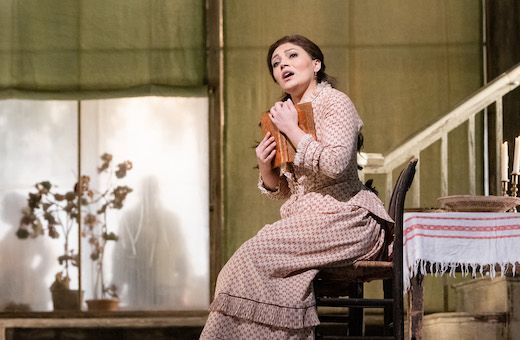I am happy to report that soprano Ailyn Pérez’ role debut as Tatyana in Eugene Onegin at the Met was a joy. Not only was she vocally thrilling in all registers throughout Tchaikovsky's score, but she was able to render the character’s emotional arcs in exquisite detail. The Letter Scene, with its adolescent emotional switchbacks, was a highlight, as was the final parting scene, whose range between anguished pianissimo and resolved fortissimo was striking. But even in the second act party scene, where Tatyana is limited to a few asides, every time Pérez sang we heard a character with a fully musically realized inner life.

The evening’s other standout was tenor Piotr Beczała as Lensky, Olga’s betrothed. Confident and brash vocally, he was everything you want a tenor to be in an opera, by turns sentimental, anguished and heroic. His second act aria, in which he mourns his love for Olga and contemplates the possibility of his impending death in a duel, was especially affecting.
In any other opera, Lensky would be the leading man. Here, however, he is second banana to the aloof title character, ably sung by Igor Golovatenko. The huge challenge of this role is to give even the hint of an idea of what Tatyana sees in him, since the character is written in the first two acts mostly as whiny and self-absorbed. While Golovatenko made a passable attempt at making Onegin interesting in the first scene, the aria in which he rejects Tatiana came across as self-congratulatory. This is an entirely reasonable choice for the character, but it dooms any credibility of Tatyana’s carrying a torch for him for four years.
Notable supporting performances included mezzo-soprano Larissa Diadkova as Filippyevna and bass Ain Anger as Tatyana's husband Prince Gremin, each with a penetrating clarity of voice. Tenor Tony Stevenson as Monsieur Triquet and bass-baritone Richard Bernstein as Zaretsky, Onegin’s second in his duel, also turned in rich and well-contoured performances in their cameos.
James Gaffigan conducted the Metropolitan Opera Orchestra in an economical yet voluptuous rendition of the score. The orchestra’s role portraying subtext, particularly Tatyana’s, and commentary was foregrounded here, to good effect. Throughout the evening, Gaffigan kept the exposition, choral numbers and dances moving at an unusually quick pace, then relaxing into the big emotional set pieces, in which he gave the singers all the time they needed. I found the brisk tempos actually quite welcome, with the exception of the third act’s opening polonaise, which was so fast the dotted rhythms didn’t quite land. The Met's chorus, as always, was superb.
Deborah Warner's production, first seen at the Met in 2013, is lovely to look at, although Tom Pye’s scenic design does raise questions. Why does Tatyana sleep in the same room that her mother entertains the local peasants in? Why is Prince Gremin’s ballroom represented by massive pillars that leave little room for the dancers? Why, when everything else has been so naturalistic, do those pillars apparently represent trees in the final scene – which the libretto sets indoors?
That said, there are rewarding touches in the stage direction. The silent presence of servants coming and going in the Larina household gives the world of the first act a satisfying three-dimensionality. Lensky, in his duel with Onegin, advances without firing his rifle; Onegin fires without advancing, a telling moment. And the symmetry of Tatyana’s farewell kiss to Onegin with his to her in the first act is lovely. However, although it’s a common trope in opera staging, a male character professing love for a female character by grabbing her and physically preventing her from leaving sits uneasily today. It simply added weight to my usual final-curtain reaction to this opera: thank goodness she’s well rid of him.


